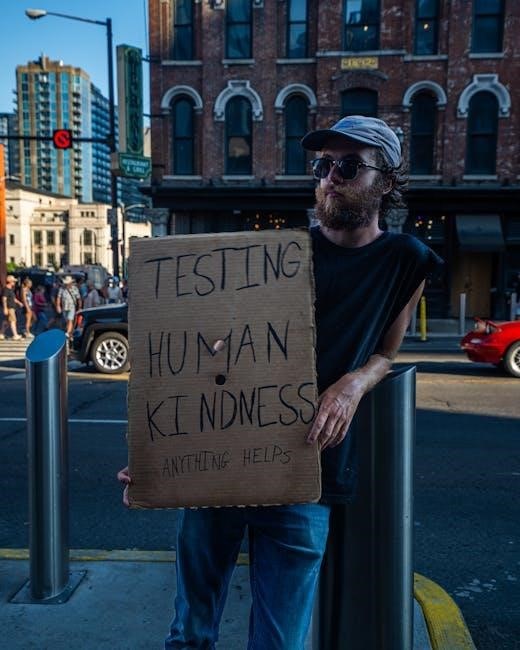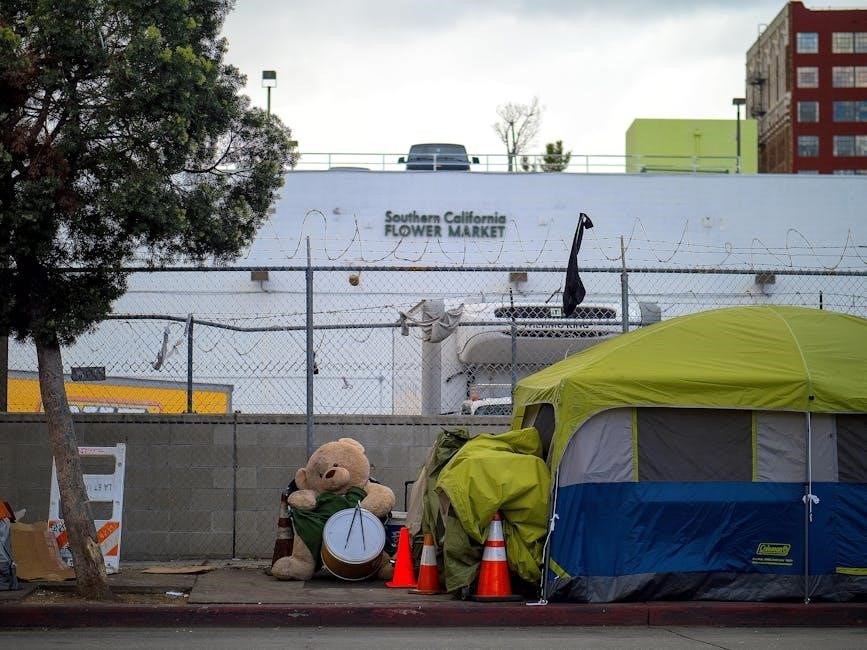Matthew Desmond’s book explores poverty and profit in American cities, providing insight into eviction dynamics, with a
focus
on urban housing and social inequality issues always.
Overview of the Book
Matthew Desmond’s Evicted: Poverty and Profit in the American City is a comprehensive book that explores the issue of eviction in American cities, with a focus on the experiences of low-income families. The book is based on years of fieldwork and research, providing a detailed analysis of the causes and consequences of eviction. According to the author, eviction is a major cause of poverty and homelessness in the United States, with millions of people facing eviction every year. The book also examines the role of landlords and the housing market in perpetuating eviction, and discusses potential solutions to this problem. Overall, the book provides a nuanced understanding of the complex issues surrounding eviction and poverty in American cities, and is a valuable resource for policymakers, researchers, and advocates. The book has received widespread critical acclaim for its insightful and thought-provoking analysis.
Importance of the Book
The book Evicted: Poverty and Profit in the American City is crucial in understanding the social and economic issues surrounding eviction in the United States. It sheds light on the human impact of eviction, providing a personal and emotional perspective on the issue. The book’s importance lies in its ability to spark conversation and raise awareness about the need for affordable housing and tenant protections. By sharing the stories of families and individuals affected by eviction, the book puts a face to the statistics and makes the issue more relatable and accessible to a wider audience. The book’s significance is further emphasized by its reception, with many considering it a seminal work on the topic of poverty and eviction in America, making it a valuable resource for those interested in social justice and urban studies, and its impact is still being felt today.

The Issue of Eviction in the American City
Eviction affects many American cities, causing housing instability and social issues, with a focus on urban poverty and inequality always present in the discussion.
Statistics on Eviction
According to recent studies, in 2013, 1 in 8 poor renting families nationwide were unable to pay all of their rent, and a similar number thought they would be evicted soon. This alarming rate of eviction has severe consequences on families and communities. The data collected by Matthew Desmond, the author of Evicted: Poverty and Profit in the American City, sheds light on the sociological dynamics of eviction. His research reveals that eviction is not just a result of poverty, but also a cause of it. The statistics on eviction are staggering, with millions of Americans facing the threat of eviction every year. The issue of eviction is complex and multifaceted, requiring a comprehensive approach to address its root causes and mitigate its effects on individuals and society. The numbers are a call to action to address this critical issue.
Consequences of Eviction
The consequences of eviction are far-reaching and devastating, affecting not only individuals but also families and communities. Eviction can lead to homelessness, job loss, and poor health outcomes. It can also disrupt social networks and support systems, making it difficult for individuals to recover. Furthermore, eviction can have long-term effects on children’s education and development. The emotional trauma caused by eviction can be severe, leading to anxiety, depression, and stress. The consequences of eviction are not limited to the individual or family, but also have a broader impact on society, perpetuating cycles of poverty and inequality. Effective solutions are needed to mitigate the consequences of eviction and provide support to those affected. By addressing the root causes of eviction, we can work towards creating more stable and equitable communities. This requires a comprehensive approach to housing and social policy.

Methodology and Research
Desmond’s research involved embedded fieldwork and data collection in Milwaukee, using a
qualitative
approach to study eviction dynamics and poverty always.
Fieldwork and Data Collection
Matthew Desmond’s fieldwork involved living alongside tenants and landlords in Milwaukee, gathering data on eviction dynamics and poverty. He spent several years conducting interviews and observations, collecting data on rent, eviction rates, and housing conditions. Desmond’s research methodology was qualitative, focusing on in-depth studies of individuals and families affected by eviction. His data collection included surveys, interviews, and ethnographic observations, providing a comprehensive understanding of the eviction process. The fieldwork and data collection process allowed Desmond to gain a deeper understanding of the complexities of poverty and eviction, shedding light on the human experiences behind the statistics. The research was conducted in a way that respected the privacy and dignity of the participants, ensuring that their stories were told accurately and honestly. Desmond’s approach to fieldwork and data collection was rigorous and meticulous.
Case Studies
Matthew Desmond’s book features several case studies of families and individuals affected by eviction, providing a detailed look at their experiences. The case studies are based on Desmond’s fieldwork in Milwaukee, where he conducted in-depth interviews and observations. The stories of the families and individuals are presented in a narrative format, making the book an engaging and informative read. The case studies highlight the complexities of poverty and eviction, and demonstrate how these issues are intertwined with other social problems. The use of case studies allows readers to understand the human impact of eviction, and to see the ways in which it affects people’s lives. The case studies are a key component of the book, and provide a unique perspective on the issue of eviction in American cities, making the book a valuable resource for scholars and policymakers. Desmond’s case studies are well-researched and informative.

Solutions and Recommendations
Providing affordable housing options and rental assistance programs can help alleviate poverty and eviction issues in American cities always with new policies.
Innovative Solutions
Implementing innovative solutions can help alleviate eviction and poverty issues in American cities, with a focus on providing affordable housing options and rental assistance programs.
Some potential solutions include community land trusts, where community organizations own and manage land, and provide affordable housing options to low-income families.
Additionally, cities can implement policies such as rent control, and provide financial assistance to low-income families to help them pay their rent, with the goal of reducing eviction rates and promoting stable housing.
These solutions require collaboration between government agencies, community organizations, and private sector entities to be effective, and can help to reduce poverty and promote economic mobility in American cities, with a focus on providing opportunities for low-income families to thrive.
Urgent Need for Scholarly Attention
The issue of eviction and poverty in American cities requires urgent scholarly attention, with a focus on understanding the root causes and consequences of eviction.
Researchers and scholars can play a crucial role in shedding light on the complexities of eviction and its impact on individuals and communities.
By examining the intersection of poverty, housing, and economic inequality, scholars can help to identify effective solutions and inform policy decisions.
Furthermore, scholarly attention can help to raise awareness about the issue of eviction and its consequences, and can inform the development of evidence-based policies and programs to address poverty and promote affordable housing.
This can ultimately help to reduce eviction rates and promote more equitable and sustainable housing systems in American cities, with a focus on supporting vulnerable populations.

and Impact
Eviction affects millions of Americans, with far-reaching consequences for families and communities, requiring comprehensive solutions and policy changes always needed now.
Evicted: Poverty and Profit in the American City provides a comprehensive understanding of the eviction crisis in America, with a focus on the human impact of eviction. The book concludes that eviction is a major cause of poverty and homelessness, and that it has a disproportionate impact on low-income families and communities of color. According to the author, eviction is not just a result of poverty, but also a cause of it, as it leads to job loss, poor health, and social isolation. The conclusion emphasizes the need for policy changes and community-based solutions to address the root causes of eviction and promote affordable housing. By exploring the complex relationships between poverty, profit, and eviction, the book offers a nuanced and insightful conclusion that informs and educates readers about this critical social issue, and its far-reaching consequences for American society always.
Impact
The book Evicted: Poverty and Profit in the American City has had a significant impact on the national conversation about poverty and housing in America. The author’s research and findings have been widely cited and have informed policy discussions at the local and national levels. The book has also had a profound impact on the general public, raising awareness about the issue of eviction and its effects on individuals and communities. As a result, there has been an increase in advocacy efforts and community-based initiatives aimed at addressing the root causes of eviction and promoting affordable housing. The book’s impact is a testament to the power of research and storytelling to shape public opinion and drive social change, and its influence will likely be felt for years to come, shaping the future of housing policy in America.
